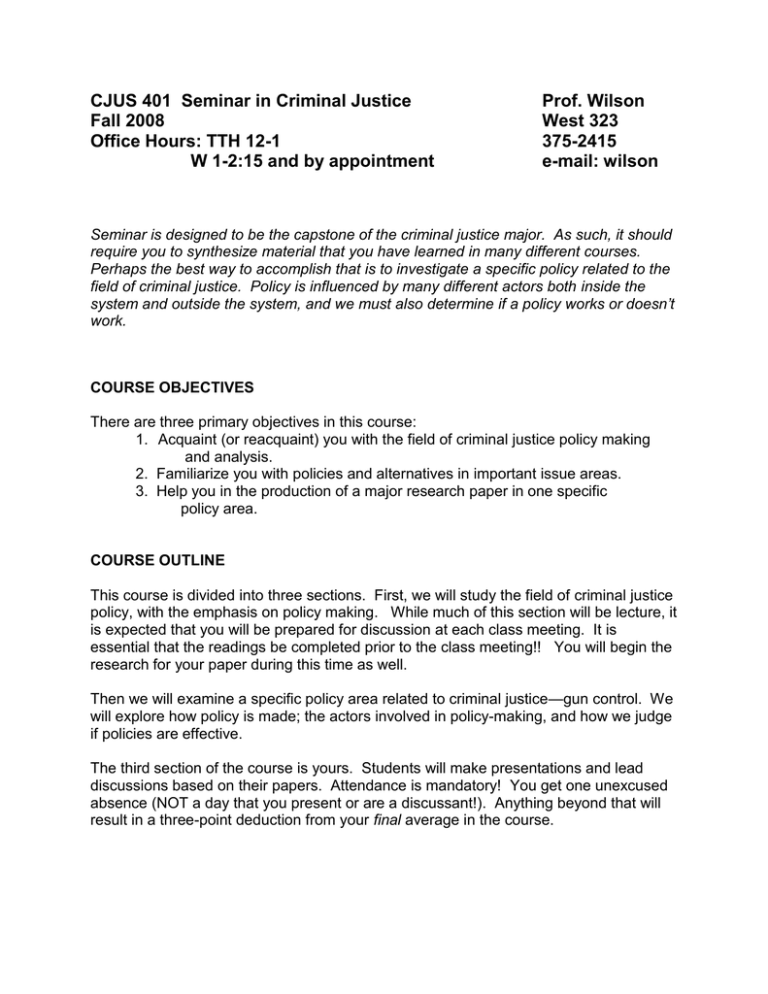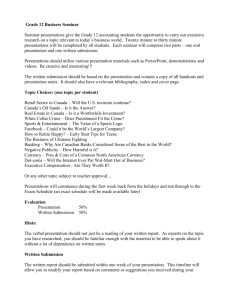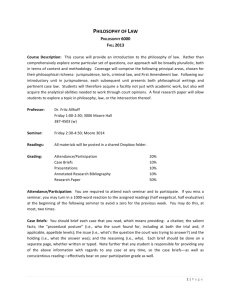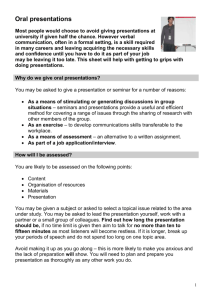
CJUS 401 Seminar in Criminal Justice
Fall 2008
Office Hours: TTH 12-1
W 1-2:15 and by appointment
Prof. Wilson
West 323
375-2415
e-mail: wilson
Seminar is designed to be the capstone of the criminal justice major. As such, it should
require you to synthesize material that you have learned in many different courses.
Perhaps the best way to accomplish that is to investigate a specific policy related to the
field of criminal justice. Policy is influenced by many different actors both inside the
system and outside the system, and we must also determine if a policy works or doesn’t
work.
COURSE OBJECTIVES
There are three primary objectives in this course:
1. Acquaint (or reacquaint) you with the field of criminal justice policy making
and analysis.
2. Familiarize you with policies and alternatives in important issue areas.
3. Help you in the production of a major research paper in one specific
policy area.
COURSE OUTLINE
This course is divided into three sections. First, we will study the field of criminal justice
policy, with the emphasis on policy making. While much of this section will be lecture, it
is expected that you will be prepared for discussion at each class meeting. It is
essential that the readings be completed prior to the class meeting!! You will begin the
research for your paper during this time as well.
Then we will examine a specific policy area related to criminal justice—gun control. We
will explore how policy is made; the actors involved in policy-making, and how we judge
if policies are effective.
The third section of the course is yours. Students will make presentations and lead
discussions based on their papers. Attendance is mandatory! You get one unexcused
absence (NOT a day that you present or are a discussant!). Anything beyond that will
result in a three-point deduction from your final average in the course.
COURSE REQUIREMENTS
Your grade will be calculated as follows:
Book summaries
10% each
Outline and bibliography
10%
Paper draft
15%
Final paper
30%
Presentation
10%
Discussant
5%
Class participation
10%
There are eight graded components in the course. There will be a 5-7 page analytical
summary of each of the books. The summary for Marion and Oliver is due on Oct. 8;
the summary for Wilson is due on Nov. 5, except those who are presenting on that date
for whom it will be due on Nov. 12. Paper topics are due in class on September 10,
preferably sooner. An outline and annotated bibliography is due in class on October 1.
This will be returned to you prior to Fall break (when all of you will be writing
diligently...right??). A first draft of your paper and the final draft (25%) will be due at
different times. Students will draw for the time their papers are due. This will allow me
to return your drafts quickly so that you will have the maximum time to write and revise.
Each student will also make a presentation in class. The order of presentations will
follow the order of drafts. The final draft is due at 4:00 p.m. on the Friday following your
presentation. Finally, each of you will serve as discussant for one other paper.
Absence on the day of your presentation or discussant will result in a zero for that
component. There will be a 5-point penalty for each day (including weekends) that any
part of your paper is late.
Yes, this is a heavy workload, especially early in the semester. This is Seminar.
According to me, it is the most important course you will take at Roanoke College. Your
thinking should be very similar to mine on this one. Do not let yourself fall behind in this
course. It is very difficult to catch up, and there will be temptation to cut corners. At
best, that will negatively impact your grade; at worst it will become an academic integrity
problem. I strongly suggest you begin to work on your paper as early as possible. It
can’t be written in a short period of time. If you maintain a steady pace, you will be fine.
Honest!
ACADEMIC INTEGRITY
The course will follow the standards of the College handbook. Any idea that is not
yours, whether quoted directly or paraphrased, must be documented. Anything else is
plagiarism and will be dealt with severely.
SPECIAL NEEDS
If you are on record with the College’s Special Services as having special academic or
physical needs requiring accommodations, please discuss this with me as soon as
possible. We need to discuss your accommodations before they can be implemented.
Also, please note that arrangements for extended times on exams and testing in a semiprivate setting must be made at least one week before the exams.
If you believe you are eligible for accommodations but have not yet formally contacted
Special Services, contact the Center for Learning & Teaching (x2248).
PAPER TOPIC
You may choose your own topic for the paper, although they must be approved by me.
Topics are due to me by Sept. 3. I would like you to focus on a specific topic—for
example, to say you want to write on corrections is too broad. You would need to
narrow that to look at one or two policies. You might examine drug courts, communitybased corrections, abolition of parole, prison overcrowding, etc. Trying to do all of those
in one paper is simply too much to handle.
OUTLINE AND ANNOTATED BIBLIOGRAPHY
Your outline should be 2-3 pages long. I need enough information so I can follow your
line of thinking and see where you are going and how you will get there. I don’t need to
know every step you will take along the way, but I need to be able to see the direction of
the path.
An annotated bibliography is a bibliography of each source you use, helpful or not, and
a brief description of that source (major ideas, relevance, etc.). You must use a variety
of sources. Suggestions include books, academic journals, news media, political
journals, government documents, interest group sources, etc. They should NOT be all
online sources. Libraries are still useful sources of material.
Remember, this is a policy analysis paper. It is not a review of popular literature on the
topic. There is no “magic number” of sources, but your paper should not rely too heavily
on just a couple of sources.
SEMINAR PAPERS
The paper's body and works cited must be 35-40 pages, typed (double-spaced) pages
in length, and also include a title page, table of contents, and abstract (about 200
words). Margins should be one inch on all sides, and you should use a 12-point font.
The goal of each project is to demonstrate understanding of the dynamics of the
criminal justice system by providing a policy analysis of a specific issue. Yes, this paper
is longer than typically required by Dr. Peppers. However, he requires all students to
read four books while I am requiring only two. The workload should be equivalent.
Each analysis should address, therefore, the following questions: What is the scope and
nature of the issue being examined? Why is action or intervention by the criminal justice
system seen as necessary to resolve this issue? Which actors (governmental and
non-governmental) are involved and why? What interests are at stake and what goals
are to be accomplished? How are these interests articulated? What policy options are
available? How would these decisions be implemented and evaluated? What is the
likely effect of these decisions and actions? What are the most likely costs, both direct
and indirect of the options? What is your policy recommendation(s) and why have you
chosen it/them?
Students should consult with the instructor during all stages of the preparation of the
seminar paper. Research notes, outline, and all drafts must be submitted with the
completed paper. The format of the paper, textnotes, and works cited should conform to
those found in the Scott and Garrison text.
Your first draft should NOT be considered a rough draft. Ideally, it should also be your
final draft. The better it is, the better your grade on that component and the fewer
revisions/additions will be necessary. I have had drafts that have received an “A” and
have required very few revisions. Copies of the outline and first draft may be made
available for review by other seminar participants. You must provide a copy of your
draft to the discussant at the same time you submit it to me.
PRESENTATIONS AND DISCUSSION
The purpose of the project presentation is to both inform the other seminar participants
of the specific findings of your own research and to educate them as to the general
dynamics of the policy process relevant to the issue you have investigated.
Presentations will not consist of the reading of formal papers. Rather, you will be
expected to present your analysis and conclusions orally, logically, and concisely.
Presentations must incorporate the use of PowerPoint applications. This is intended not
only to enhance the quality of the presentation, but also to assist in the development of
skills that should be of value to prospective employers. A training session on the use of
power point technology is incorporated into the seminar.
The goal of the discussants is to examine the content of presentations. They should
criticize the research technically, substantively, and practically. They should explore
further ramifications and implications of the issue being presented.
TEXTS
Nancy E. Marion and Willard M. Oliver, The Public Policy of Crime and Criminal Justice,
Pearson/Prentice-Hall, 2006.
Harry L. Wilson, Guns, Gun Control, and Elections, Rowmand & Littlefield, 2007.
Gregory M. Scott and Stephen M. Garrison, The Political Science Student Writer’s
Manual, 6th ed., 2008. (If you have the 7th edition, that will suffice)
CLASS SCHEDULE:
Intro to Criminal Justice Policymaking
Aug. 27 Introduction; Researching your paper
Sept. 3 Overview of the Policy Process
Marion and Oliver, Part 1
Policy Actors
Sept. 10 Governmental Actors
Marion and Oliver, Ch. 4-7
Sept. 17 Non-governmental Actors
Marion and Oliver, Ch. 8-9
The Criminal Justice System
Sept. 24 The System and a Brief Example
Marion and Oliver, Parts 3-4
Policy in Action—Gun Control
Oct. 1 Introduction and Second Amendment
Wilson, Introduction and Ch. 1
Outline and annotated bibliography due
Oct. 8 Data and Policy
Wilson, Ch. 2-3
Marion and Oliver summary due
Oct. 22 Non-governmental actors
Wilson, Ch. 4-6
Oct. 29 Virginia state policy; conclusion
Wilson, Ch. 7-8
Policy Papers and Presentations
November 5, 12, 19, and December 3
Paper Presentations
Wilson summary due on Nov. 5 (Nov. 12 if presenting on Nov. 5)





